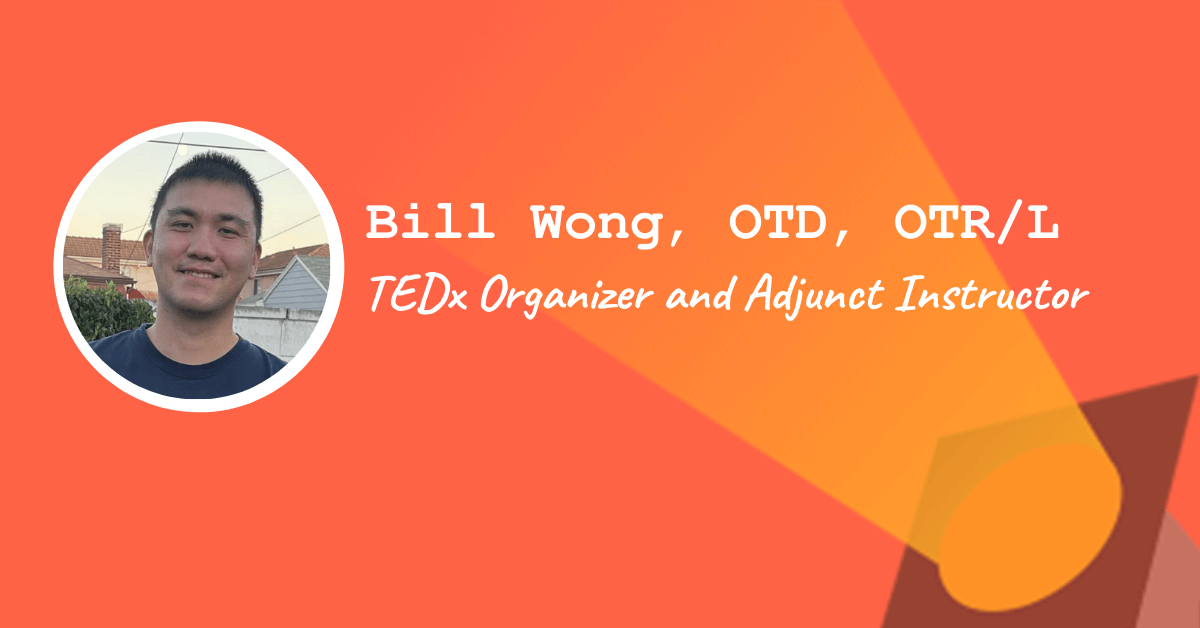This week’s non-clinical spotlight features Bill Wong, OTD, OTR/L, who is a TEDx organizer, adjunct instructor, and a practicing OT.
This post may contain affiliate links or codes. This won’t increase your cost, but it helps keep TNCPT alive, and free of annoying ads! Thank you for your support. 🙂
What is your full name and title, and what work do you do currently?
Bill Wong, OTD, OTR/L is my title.
I am an occupational therapist for Interface Rehab in a skilled nursing facility (SNF) setting, an adjunct instructor for Stanbridge University’s OTA and MSOT programs, and I organize virtual TEDx events.

Where are you located?
I live in Monterey Park, California.
Where did you go to OT school, and what year did you graduate?
I went to USC for both my MA and OTD. I graduated in 2011 for my MA, and 2013 for my OTD.
What did you do when you first finished school, and for how long?
I tried pediatrics for three months in 2013. Then, I had a failed venture in private practice for almost a year.
I have been in a skilled nursing facility setting since 2014, and I added academia to my plate in January 2019.
What did you enjoy about your early roles? What didn’t you enjoy?
Being in pediatrics exposed my weaknesses in play skills. Also, the transition from being a student to a practitioner was definitely harder than I thought it would be.
As for my SNF job, I appreciate the scheduling flexibility, since I am not typically a morning person. I appreciate that I can take time off without feeling too guilty thinking about make up visits upon returning to work.
Of course, I also appreciate that this job lets me take time off if I need to do guest lectures for MSOT/entry-level OTD programs in the LA area.
At what point did you realize you wanted to do something non-clinical with your background, and why?
My first exposure to TEDx was at TEDxGrandForks, where I was a speaker in 2015. At that time, I wasn’t too interested in organizing. However, after my second TEDx experience as a speaker, I decided to venture into this space myself in 2018.
I started to get inquiries from the OT community about how to get on the TEDx stage as a speaker. That was when I thought:
“I want to learn how to run a TEDx talk. I know that I won’t start from nothing, because I have attended TEDx events on top of my own speaking experiences. It can be a proactive way to showcase timely messages about OT.”
How did your involvement as a TEDx organizer progress?
Aside from being involved in the American Occupational Therapy Association and working in my other professional roles, I am now organizing virtual TEDx events.
I made a reluctant decision to step away from organizing on-ground TEDx events because doing so is way beyond my means financially. However, when COVID became a pandemic, many TEDx events transitioned to a virtual setting, so there’s plenty of opportunity.
At first, I was skeptical about whether I could get involved. Over time, I found people in the TEDx community across the globe to mentor me, especially when organizing virtual events. As I attended more virtual TEDx events and bounced ideas off of veteran TEDx organizers, I realized that I had not done sufficient homework before I applied for my first TEDx event license in 2018.
So, while I ventured on my own for the most part, having connections in the TEDx organizer community made my present experiences a lot easier!
What I’ve learned is that there are easier formats to organize. Plus, keeping things simple is perfectly appropriate during COVID times, particularly because there are so many virtual TEDx events to choose from due to shift during the pandemic.
Are you still treating patients, or are you solely non-clinical?
I am still treating patients and teaching students as adjunct faculty.
What percentage of your time is spent clinically vs. non-clinically?
This percentage varies depending on my non-clinical commitments, whether it’s teaching, or TEDx events. It also depends on when these TEDx events occur during the year, since TEDxLive, TEDxCountdown, and TEDxWomen are time-sensitive formats, whereas other events can sometimes give you a 12-month window in which to operate.
How long have you been involved with TEDx?
This is my third year. I was the primary organizer for TEDxStanbridgeUniversity before pivoting back to TEDxAlmansorPark permanently. I am on the verge of passing the TEDxStanbridgeUniversity license to staff at Stanbridge University due to the fact that I can’t own both concurrently.
How does one become a TEDx event organizer?
Every potential TEDx organizer has to go through an application process before anyone has the permission to run the events.
For each event I plan to organize, I must submit an application that presents an overview for it for approval. This may take up to eight weeks before TED headquarters provides a reply to either approve the event, or provide a list of necessary changes to be made.
Did you get any special certifications or training along the way?
No. However, there are exclusive resources for TEDx organizers.
TEDxHub and TEDxCommunity (on Facebook) have been helpful in getting timely responses to pressing event related questions. TEDx Community Hangouts have been helpful in listening to tips in particular aspects of how TEDx events operate.
Also, connections to other TEDx organizers have been helpful because I can get pointers on what I can do that is within my means, especially for these virtual events.
What are some of the things you did to stand out, take initiative, and advance?
I’ve garnered a lot of respect for the fact that I have followed suit with other TEDx organizers to organize virtual TEDx events. After all, not many TEDx organizers are also health professionals.
Also, because I am now choosing easier formats to organize, I can use the opportunity to focus on quality instead of quantity in terms of the TEDx talks I organize.
How have people reacted to you leaving patient care?
Technically, I have not left patient care. However, I know many program directors in OT and OTA programs that were shocked that organizing virtual TEDx events is actually feasible. I have been suggesting to them that they can be possible entry-level OTD capstone projects or SOTA outreach projects.
What’s a typical day or week in the life like for you? What types of tasks and responsibilities fill your time?
I probably spend two to three weeks prior to each virtual TEDx event creating a program. The majority of the content comes from TED-sanctioned conferences (e.g. TEDMonterey, TEDCountdown, and TEDWomen for 2021).
I also spend about 15-20 hours per event speaker to get their recordings ready.
What are some of the challenges of your role? What are the rewards?
For someone with executive functioning challenges, organizing a TEDx event, let alone three, is very difficult, even in the easier virtual format!
The reward, especially when I pick my own speakers, is hearing that a speaker checked something off their bucket lists because of the events I organize.
How do you think working as an OT prepared you for this role?
I can curate TEDx talks by OT students and practitioners well, because my knowledge of the field will ensure the messages will be educational for the general public to know more about OT.
Roughly speaking, how are the hours and pay compared to patient care?
Being a TEDx organizer is a labor of love.
Many people can diss how expensive these events can be for attendees, especially pre-COVID. But, having organized two of these, I realized that these organizers are some of the most powerful change agents in the world.
They also do a thankless job because they are not paid. In fact, if their events run at financial deficits, they have to bear the financial burden!
What type of person do you think would do well as a TEDx organizer?
A great TEDx organizer would be someone who is:
Action-oriented
Even if you organize a standard TEDx event, 12 months may seem like a lot of time. But, that time passes quickly if you’re not on top of things and taking action!
Organized
These events require an organized person, especially considering that the primary organizer might have to wear many hats.
A leader
The bigger these events are, the stronger the leadership skills have to be.
Detail-oriented and ethical
These go hand-in-hand in because it is important that the primary organizers make sure that everyone under them follows all TED guidelines. They may have to read particular sections over and over to get an idea of what the rules mean.
Committed
You put your credibility on the line! It’s similar to how you put up your professional license on the wall of the clinic you work at.
Do you work remotely or on-site?
When organizing virtual TEDx events, I work out of my home.
What is next for you? What do you want to do with your career long-term?
Organizing TEDx events will always be my side gig. My primary goal is to be in academia full-time.
How frequently I organize TEDx events will depend on my energy and the priorities of Stanbridge University.
What would you recommend to someone who is considering getting involved with TEDx?
If you have spoken at TEDx stage before, you have some advantage because you should know the differences between a so-so and well curated speech. You also would have insights about how speakers feel prior to such events.
However, if you can volunteer to be part of a TEDx planning team in your local community, do it!
If not, then attend whatever TEDx events you have access to, virtual or in-person.
What would you like to change most about TEDx?
The fact that there is not another OT in the organizing space is not acceptable. I will continue to lead by example!
If you could give one piece of career advice, what would it be?
Don’t be afraid to do things that nobody has done before. You may stumble a few times, but that’s OK.
Do you have any other advice for occupational therapists who want to follow in your footsteps?
If you want a decathlon in leadership, organizing TEDx events will be one that tests all your leadership skills!
Want to start your non-clinical career, but don’t know where to start?






